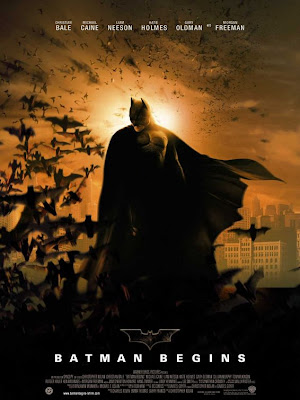
It was only a few weeks ago that I found out that Christopher Nolan is English. I was reading about him in anticipation of seeing Inception. I felt a great sense of pride when I found out he was English, I get that with people I really admire, I think, awesome, here's one of my countrymen doing something amazing. The Dark Knight (also directed by Nolan) is one of my favourite movies, and I have a real fondness and intrigue for Batman, always have done, there is something about the idea of Batman that always seemed more plausible than the other superhero comics/movies I read/watched, he wasn't too straightforward or ridiculous, and he was never too good, which made Superman's goodness sometimes hard for me to take in because it was so upsetting when people would be horrible to him.
I remember going to see Batman Begins at the cinema, I wasn't sure what to expect, I love Burton's take on Batman (lets ignore the other Batman movies that came out between then and Batman Begins) and so I remember being sat in the cinema watching Batman Begins and not really being in the right state of mind to really enjoy the film, there was a lot of pressure and expectation, and at the time I felt underwhelmed by what I saw. As I said before, The Dark Knight is one of my favourite movies, and really after seeing that at the cinema - 7 times! you'd think it'd have made me want to watch Batman Begins again, I mean it's the same director for Christ's sake, and a solid cast - but nope, I left it all this time, until last night to rewatch it, and Batman Begins: you are a fantastic movie, really really great, sometimes a movie takes that second watch just to click.
The lonely existence of Bruce Wayne is brilliantly executed by an always very unanimated Christian Bale (I mean this as a good thing, Bale has this smirky acting style which reminds me somewhat of Harrison Ford). We really get a sense of the anguish Bruce Wayne went through in seeing his parents murdered before him as a child, and the disarray and upheavel which this impacted on his life.
Bats! We learn where Bruce's inspiration for Batman as a symbol came from, and it stems from fear (scary child bat encounter - argh) and thematically we understand the importance of Bruce coming face to face with his fears, and learning to mature past wanting revenge, to wanting to retain the good that is still left in Gotham City (a city which Bruce's father helped to make). We understand the burden that Bruce feels he carries, and we believe in his need to feel like a protector of Gotham City, and of the system which failed him.
The movie features lots of excellent dialogue. The training stage of the movie, where we see Bruce Wayne acquiring the strength needed both inward and outward to be able to face his deepest fears, features some excellent exchanges between Bruce and his mentor Henri Ducard (Liam Neeson).
Henri Ducard: Your compassion is a weakness your enemies will not share.
Bruce Wayne: That's why it's so important. It separates us from them.
I also completely adore the relationship between Bruce Wayne and Alfred (Michael Caine). This a a relationship I have always loved, and the pairing of Bale and Caine is brilliant in that the distant and lonely Bruce really finds a sense of family and home with Wayne Manor's resident butler, and subsequent carer for Bruce - Alfred.
I love the repeated exchange between Bruce and Alfred, where Bruce says to Alfred: 'Haven't given up on me yet?' to which Alfred replies with a smile: 'Never!' It's so charming and says a lot about how loyal Alfred is to Bruce, and we understand Bruce's trust in Alfred, as he confides in him about his idea of becoming a protector of the city, his Batman creation.
It's just so cool watching this movie to see how Batman emerges from being an idea, to actually being an actual reality, and one that Bruce Wayne chooses to stick with. We also observe how Bruce struggles to retain his own life and identity alongside this dual identity of his, a factor which proves difficult in entertaining a relationship with childhood friend and now assistant DA Rachel Dawes. 'It's not who you are underneath, it's what you do that defines you'
I love Batman. I love this movie. Batman Begins is a perfect beginning to the Batman saga, the key players are set up, Commissioner Gordon is honest and wonderfully played by one of my favourites - Gary Oldman, Gotham itself looks like the cool and imposing city it should be, and Arkham Asylum is crammed full with the city's insane. This is the (almost) perfect prelude to the masterpiece which came next: The Dark Knight.


















